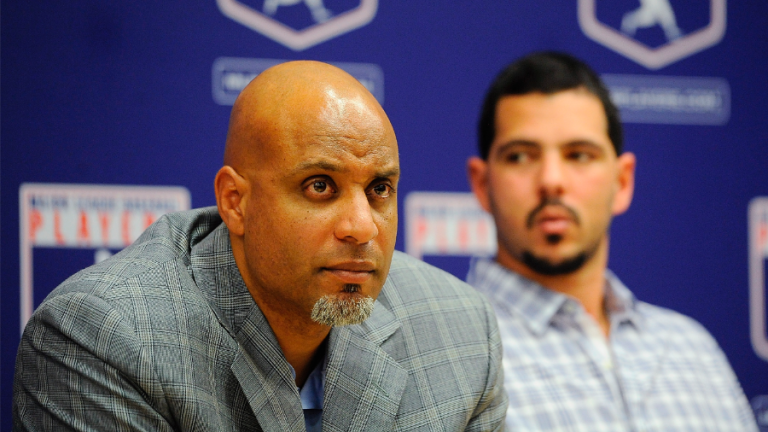
Another day has passed, and it does not seem as though we are any closer to the end of the lockout and a resumption of a normal offseason and typical preparations for a new campaign. In this series of articles, we are taking a look at the key issues over which MLB and the MLBPA are haggling, presenting Ken Rosenthal’s thoughts from The Athletic, and adding commentary.
In part one here on MMO, we discussed ideas to bring the sides together on free agency. In part two, arbitration is on the table. This is a hot topic, one which the players fought for and won decades ago. Currently, arbitration is available to players after three years of MLB service (a few players each year are considered “Super Two,” and are deemed eligible for arbitration after two years). Prior to 1987, arbitration was available to players after two years of MLB service. The owners negotiated a change in 1987 that worked nicely for them.
Ironically, arbitration impacts a small number of players each year (17 in 2021 including Francisco Lindor, 15 in 2020 including Marcus Stroman and Mookie Betts) from Spotrac. However, the players want to hold onto the process, and make it available after two years of service in a new agreement. The owners want to eliminate arbitration, and have proposed replacing it with a pay-for-performance system, such as basing pre-free agency salaries on a metric or metrics (WAR has been discussed). The players might be open to a metric-based component (from Rosenthal’s article), but clearly would rather keep and expand arbitration.
Baseball does have a salary issue for its younger players. From Travis Sawchik in The Score, baseball’s minimum salary lags behind that of other sports.
The minimum salary for the big four professional sports in their current or most recent season:
| League | Season | Min. salary |
|---|---|---|
| MLB | 2021 | $570,500 |
| NFL* | 2021 | $660,000 |
| NHL | 2021-22 | $750,000 |
| NBA* | 2021-22 | $925,258 |
So herein lies the opportunity. Younger players in baseball are paid less than younger players in other sports. Players have almost no control over their salaries in years one through three (except for the Super Two Players), and the owners have proposed eliminating arbitration, the first opportunity players have to exert some control over their pay. How can they bridge this gap?
Rosenthal proposes raising the MLB minimum salary from $570,500 to $800,00 to provide an immediate boost. He further suggests increasing the percentage of players with two years’ service who are arbitration eligible from the current 22% (it was 17% of such players in 2012).
Opinion
Raise the minimum salary? Absolutely. Moving on.
So many cases are settled before arbitration, the vast majority of them, that it seems like the system can perhaps be replaced. The question remains, what would be a better system, to give players with shorter service time an opportunity to have some control over their salaries?
How about if we pull through the idea from the “franchise tag” suggestion in free agency, and index pre-free agency salaries against players of the same position? For small-market teams to retain their free-agent stars (some of them), the proposal was to designate one or two players per team as franchise icons, not allow them free agency, but index their salaries against top-paid players of their positions (and escalate the index if a player is designated more than once, as is done in the NFL). Maybe for pre-free agency, the index could be the fifteenth through twentieth ranked salaries at the position.
Using an example, let’s say that the average salary is $1,000,000 for second basemen. A second baseman who cannot come to terms with his team, but is eligible for this benchmarking (let’s use after two years of service through five years), is indexed against the average of the fifteenth through twentieth second basemen (this could change based on the player’s service time, moving the index up with increased service time), at a percentage commensurate with his performance, using an agreed-upon metric or metrics. Just for illustration, let’s use bWAR. A player with a bWAR of 2.0-3.0 the previous season might get 90% of the index, while a player with a bWAR of 3.0-4.0 might get 100% of the index (and so on).
This expands the eligibility for some type of objective salary-setting to two years of service and places free agency after five years (wins for the players), and uses a metric-based, pay-for-performance system rather than arbitration (a win for the owners).
It may not be perfect, and the index numbers and percentages may have to change, but perhaps this could be common ground. While owners openly dislike arbitration, many players have expressed it’s uncomfortable for them too, as they sit in a hearing, listening to their teams essentially devalue their performance the previous season.
It’s a new CBA (hopefully). Why not bring in new and fresh ideas? They don’t seem to be progressing trying to make the existing concepts work in the next agreement.
Next up will be the luxury tax.















